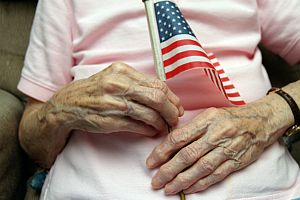 There are more than 200 different types of arthritis, and the bulk of them are not what medical researchers and clinicians would call “hereditary” conditions. However, the genetic makeup of some individuals can make it MORE LIKELY that they will develop certain types of arthritis. We call this a “genetic predisposition”. It’s important to understand this distinction, since many people who carry a predisposing gene will never actually develop the disease.
There are more than 200 different types of arthritis, and the bulk of them are not what medical researchers and clinicians would call “hereditary” conditions. However, the genetic makeup of some individuals can make it MORE LIKELY that they will develop certain types of arthritis. We call this a “genetic predisposition”. It’s important to understand this distinction, since many people who carry a predisposing gene will never actually develop the disease.
Rheumatoid arthritis offers one example. Specific genes, such as HLA-DR4 and HLA-DRB1, can increase your predisposition for acquiring this form of the ailment. According to rheumatology.org, 12%–15% of identical twins develop the condition, whereas only 4% of fraternal twins suffer from it. One Harvard medical report states that rheumatoid arthritis affects 2% of the population but is 3 times more likely to affect women than men. Young and middle-aged adults make up the bulk of sufferers, but the condition can also strike children and seniors. Rheumatoid arthritis occurs as a result of joint inflammation that is caused by the body’s immune system attacking the lining of a person’s joints.
The most common form of arthritis—called “osteoarthritis”—typically occurs among the elderly and seems less strongly tied to genetics. Osteoarthritis is usually a result of daily wear and tear on a joint, causing the cartilage protection between the bones to wear thin and the bones themselves to rub against one another. This results in discomfort or even excruciating pain. Although members of some families are more susceptible to osteoarthritis than others, lifestyle and environmental factors appear to play a larger role. Age, injury, inactivity and obesity all contribute to the likelihood of developing the condition.
Once a person has actually developed arthritis, the severity of symptoms can be influenced by a variety of factors. For instance, certain hormones seem to either increase or decrease the pain that comes with some forms of the disease. Some women have reported a decrease in arthritic symptoms after becoming pregnant only to have the pain return once the pregnancy was over. Other forms of arthritis, such as ankylosing spondylitis, are not affected by pregnancy hormones. Those who suffer osteoarthritis of the hip and knee usually observe a slight increase in symptoms while pregnant, since relaxed ligaments and greater weight puts more strain on the joints.
While there is no cure for rheumatoid arthritis or osteoarthritis, a variety of treatments are available to help patients maintain function and manage pain. In particular, chiropractic care offers an effective option that is both drug- and surgery-free. If you’d like to learn more, please call or visit our office.














